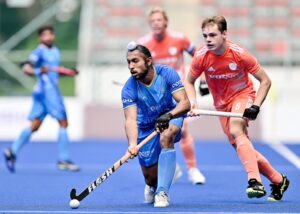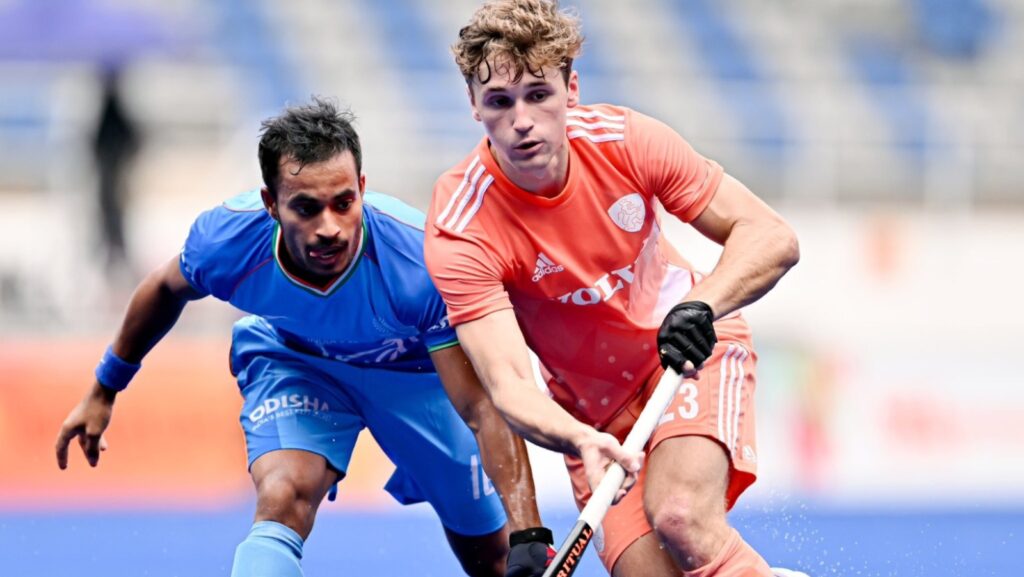
K Arumugam
These boys are men now. India’s U-21 national team came through a stern test against the formidable Netherlands in the 2023 FIH Junior World Cup in Kuala Lumpur, Malaysia, on Tuesday.
These young men in blue are surely walking tall now. They’ve become strong contenders for the title and are set to carve a niche for themselves in the annals of the competition.
India’s present and future may be bright. But its Junior World Cup past is murky, revealing utter confusion, lack of direction and vision on the part of petty officials, who believed that the sport was their fiefdom.
Let’s take a leaf from a phase in that sordid past.
The Indian team was ready to fly to Ipoh to play in the Junior Asia Cup in Ipoh, Malaysia, a qualifier for the 1993 Junior World Cup in Barcelona.
The squad was put up — where else? — in the dormitory of the Jawaharlal Nehru Stadium, New Delhi, after they arrived from Bangalore where they had undergone a month-long camp.
A day before the team was to leave for Ipoh, PA Raphel, the coach, was shown the door. His mistake? Employing ‘Total Hockey’ instead of the traditional sub-continental style.
The reasoning was that India had done badly at the 1992 Barcelona Olympics, with Balkishen Singh, the coach, adopting ‘Total Hockey’ methods. Failure in those games meant the term was anathema to old-timers in the then Indian Hockey Federation (IHF).
One of the selectors M Rajagopal (then in his late 60s) was asked to replace Raphel.
The demoralised team expectedly finished fourth when the minimum requirement to qualify for the Junior World Cup was third place.
If this was the story behind failing to qualify for the 1993 edition, it wasn’t too shocking. After all, India hadn’t made the grade at the previous Junior World Cup (1989) in Ipoh either, having failed to make the final at the Junior Asia Cup in New Delhi earlier that year. The Indian Colts finished third and failed to secure a berth at the global junior event.
India participated in the first three Junior World Cups (1979, 1982 and 1985), finishing fifth in each. Entries then came as a way of entitlement.
When the qualifier concept was introduced after 1985, India missed out on the next two editions.
https://twitter.com/revsportz/status/1735218439541993702?s=48&t=xSE7pmaj2J2OhuNtVlocrQ
Thanks to the otherwise stuttering administrative duo of KPS Gill and Jothikumaran, the junior programs were revived in the mid-1990s.
Most of the credit, however, should go to the coaching combination of Vasudevan Baskaran and Ramesh Parameswaran, who gave shape and confidence to India’s juniors on the world stage.
Under the duo’s tutelage, the team, participating in the 1997 Junior World Cup at Milton Keynes in England, beat Germany – intriguingly, India’s semi-final adversary in Kuala Lumpur today – before they engaged Australia in the final.
India lost that game 2-3 more than a generation ago, but Gill, the IHF supremo, got into the bad books of the FIH after casting aspersions on the officiating.
Four years later, Gill flew to distant Hobart, Australia, to witness India upgrading silver to gold. In the Tasmanian capital, India beat Argentina 6-1 leaving nothing to chance or alleged officiating discrepancies.
However, no Indian member from that golden team was given the FIH Rising Star Award for 2001. Was India off the FIH radar because of its stalemate with the IHF?
However, Hobart was the turning point for India’s junior program. Qualifying for the apex event since then has never been an issue, thanks to strong work at the base and timely programs.
For the Latest Sports News: Click Here

India failed to win a medal in Rotterdam, in the Netherlands, in 2005. They lost the bronze medal match against Spain when a goal was disallowed after a minute.
“How a goal can be disallowed so late” exclaimed Harsha Bhogle, commentating for ESPN at the time.
Interestingly, Spain have entered the semifinals for the first time since then – a good 18 years after the controversy.
India missed out on a medal at the next two editions – Singapore-KL in 2009 and New Delhi in 2013 – before returning to the top step of the podium in 2016 in Lucknow.
Credit went to Harendra Singh, the coach, for reviving flagging fortunes, and in style. India surged to the title with an unbeaten record.
In front of a record crowd that included the who’s who of the Uttar Pradesh elite, India beat the emerging power Belgium 2-1 for the gold medal and the glittering trophy.
Roelant Oltmans, the Dutchman now coaching Pakistan in Kuala Lumpur, was the chief coach of the senior India squad. He, however, claimed credit for the Lucknow success, implicitly doing so at a media conference when he said he had already coached a Junior World Cup-winning team. This writer, though, politely reminded him of Harendra Singh. His response, albeit in a murmur, was: “I was the manager.” Be that as it may, it was an epic win.
The event stayed in India. From Lucknow, it moved to Bhubaneswar in 2021. Six of the boys here in Kuala Lumpur were part of the team, led by Vivek Sagar Prasad, the little dynamo, that failed to get past Germany in the semifinals. The Germans put paid to Indian aspirations with a 4-2 victory.
“We all cried the entire day,” recalled Uttam Singh, the captain. “Even today, we cannot digest that we lost to Germany so badly.”
After taming The Netherlands, the boys brace for the six-time champions who have finished among the medals 12 times in 13 appearances in the Junior World Cup.
The 18 Indian colts at the Bukit Jalil stadium in Kuala Lumpur may not be aware of Germany’s imposing history in the Junior World Cup, or of Paul Lissek, the renowned coaching guru who is here. Lissek coached the Germans in the first four Junior World Cups, with his tutelage yielding three golds and a silver. All the Indians remember is the pain of the Bhubaneswar semi-final.
The defeat to Germany two years ago still rankles and Uttam, for one, knows that the young Indians need some soothing balm to bring back the smiles again. That form of relief leading to joy can only come with victory today.
Kuala Lumpur was the setting for one of the finest days in India’s hockey history. The images of 1975 may have paled, but they remain in the memory. Uttam and his charges have a gilt-edged opportunity to revive the spirit of ’75 with an entry into Saturday’s final.
The opponents may be different – Pakistan bowed out to Spain in the quarterfinals – but playing in a World Cup final, junior or senior, in Kuala Lumpur may be the tryst with a sweet twist that the country hopes for.




